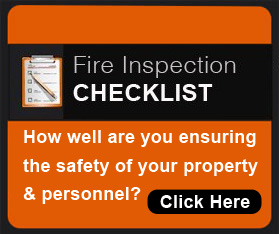Businesses in the Greater Toronto Area should be aware of shifting currents in Ontario Fire Code enforcement that increase their likelihood of exposure to fire-related costs. More often, these include not only risk of fire damage, business interruption and replacement costs, but also risk of fines for non-compliance. The fines themselves are in business-impeding amounts that far outshadow what it would have cost to comply with Fire Code in the first place.
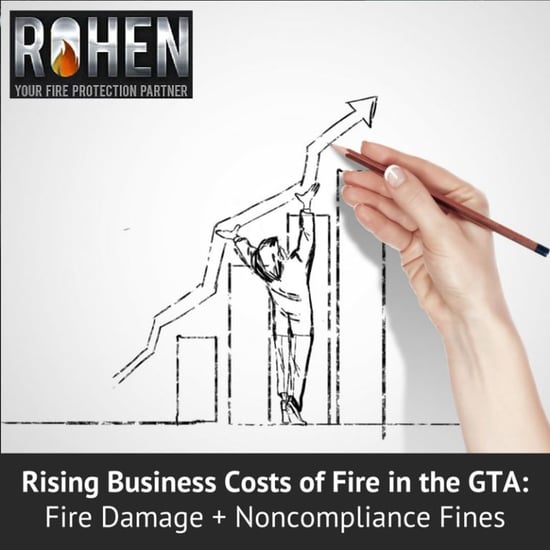
No working smoke alarms? $100,000 for corporations in Ontario
Ontario law requires working smoke alarms on every storey of a home and outside all sleeping areas. Not having working smoke alarms can result in fines up to $50,000 for individuals and $100,000 for corporations. Often an additional victim fine surcharge is applied, as well as court costs. Where multiple owners are involved, the fines can be applied to each of them (i.e. two owners = 2x fines). In the worst cases, offenders are subject to incarceration periods of 20 days to 3 years. That doesn’t include costs of actually bringing buildings up to code to be in compliance. Where they are unable to do so, owners risk having their businesses shut down, and/or accruing additional daily fines of as much as $20,000.
Here at Rohen Fire, we follow the Fire News Bulletin published by the Ontario Ministry of Community Safety & Correctional Services, which compiles regional news on fires and fire code violations, as well as other sources. While we never intended to compile a comprehensive list of fines and fires, we do often pick up on news coverage of fire damage and costs of non-compliance, which we share on social media. We recently audited our social media coverage of these events to see if any interesting trends emerged.
One of the things that is clear in article after article across multiple media outlets, when municipal fire authorities are interviewed, they consistently refer to “zero tolerance,” and “sending a message.” As regional fire authorities confirm in this Barrie Examiner article, the push for zero tolerance and fire compliance through legal channels is coming from the top, at the Ontario Fire Marshal's office.
If you are not yet compliant with Fire Code, get on it now!
Of 43 high-cost Ontario fire events we've tracked on social media since early 2014 (mostly in the GTA), 20 were fires with significant financial impact, and 31 involved significant Fire Code violation-related fines.
We analyzed the stories that we have tracked, but bear in mind this analysis should be kept in perspective. Our tracking is far from comprehensive, and the media coverage (and our ability to keep up with it) hasn't necessarily been consistent. Generally, fire events with more significant damage tend to be more newsworthy and share-worthy, so the events we have tracked here skew towards larger fines, larger fires, and fires impacting businesses or organizations versus single-family homes.
ANALYSIS OF TRACKED HIGH-COST FIRES & FINES
Temporal distribution of high-cost fire events (fines + fires) among tracked events:
- 1 event in January 2014
- 2 events in February 2014
- 2 events in March 2014
- 9 events in April 2014
- 1 event in May 2014
- 2 events in June 2014
- 3 events in July 2014
- 3 events in August 2014
- 3 events in September 2014
- 1 event in October 2014
- 1 event in December 2014
- 7 events in January 2015
- 2 events in February 2015
- 5 events in March 2015
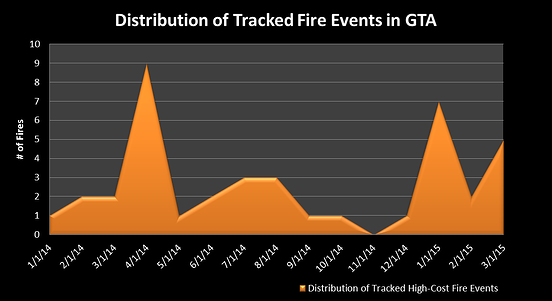
FIRES AMONG TRACKED HIGH-COST EVENTS
Costs of tracked events with fire damage:
- 3 events with no estimate of damage but were declared a total loss (so you could probably assume minimum several hundred thousand dollars of loss).
- 1 event that was a total loss with no exact estimate but generically pegged “in the millions.”
- Average $602,000 dollars in estimated damage for tracked fire events with specific estimated damage.
- $9.64 billion in total estimated fire damage just for the tracked incidents.
What types of businesses were most likely to be impacted by these higher-cost, high-visibility fires?
- 5 were restaurants
- 5 were residential businesses (apartment buildings, lodges or hotels)
- 2 were schools
- 3 separately-tracked events impacted multiple (at least 6 total) retail businesses
- 6 were manufacturing or industrial facilities
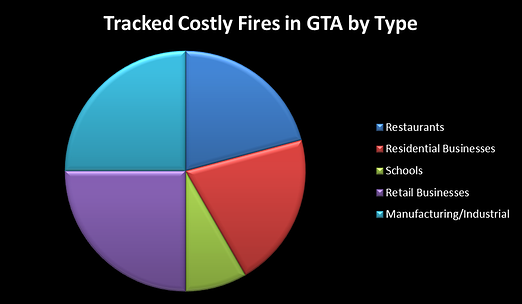
Temporal distribution of tracked fires:
- 6 were in April 2014
- 1 in December 2014
- 1 in February 2015
- 2 in January 2015
- 2 in July 2014
- 2 in June 2014
- 2 in March 2014
- 3 in March 2015
- 1 in September 2014
FINES AMONG TRACKED HIGH-COST EVENTS
Of tracked events with Fire Code violation fines, what types of businesses were involved?
- 1 restaurant
- 2 recycling/salvage facilities
- 2 rooming houses
- 9 appear to be smaller, single building rentals
- 2 were short-term residential rentals (motel/resort)
- 6 were larger multi-unit and/or multi-building, primarily residential properties
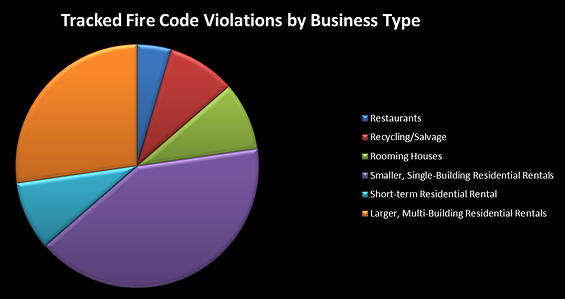
Of tracked fines, what instigated the attention?
- 10 stemmed from post-fire investigations
- One was from a random inspection
- One came from responding to a nuisance alarm
- 2 initiated with response to reports of smoke
- 1 started with a complaint about electrical issue
- 5 were inspections with unspecified impetus
- 2 were related to multiple ongoing complaints and failure to address prior violations over an extended period of time
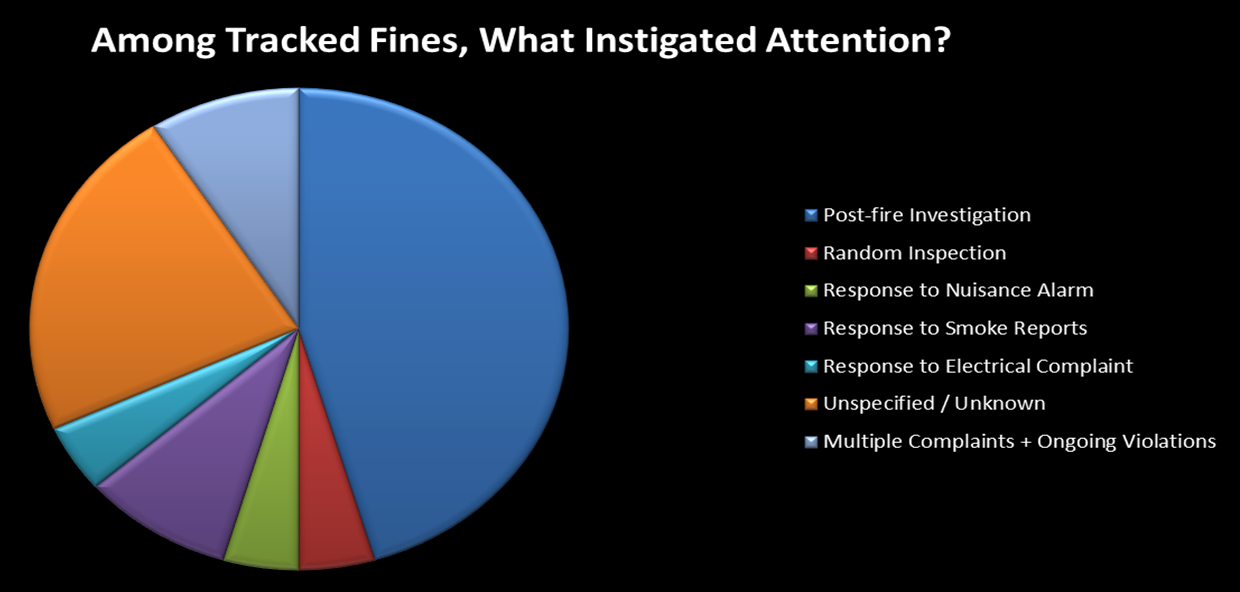
What we know about the costs of these higher-profile noncompliance cases:
- In one case, the offender got 20 days in jail
- In one case, the offender got 3 years in prison from related criminal charges
- Total fines from tracked cases where fine amount was available: $3,281,875 million dollars
- Average $172,730 per fine
- Average $21,475 fine for larger multi-unit/multi-building properties where amount was given
- Average $385,000 fine for short-term residential rentals (motel/resort)
- The one restaurant’s fine was $20,000
- Average $40,000 in fines for recycling/salvage facilities
- Average $1,155,000 in fines and court costs for rooming houses
- Average $7,437 in fines for apparently smaller, single building rentals
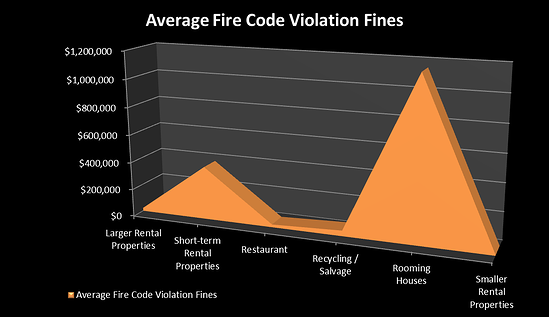
We did not break the tracked violation fines down over time as the media coverage of fire code violations often occurs closer to a court date rather than the date of the actual violation, so it wouldn't likely shed light on any periods of greater enforcement.
Download the full list of tracked events attesting to the high costs of fire in the GTA in this pdf summary.
Was any of this surprising to you? Let us know what you think in the comments.
If you enjoyed this post, consider subscribing!
You may also be interested in these related posts:
- How to Maximize Fire Safety & Minimize Loss at Your Manufacturing Facility
- Why Fire Sprinkler Testing & Maintenance is Smart Business for Toronto
- Fire Sprinkler FAQs for Toronto Business & Property Owners


